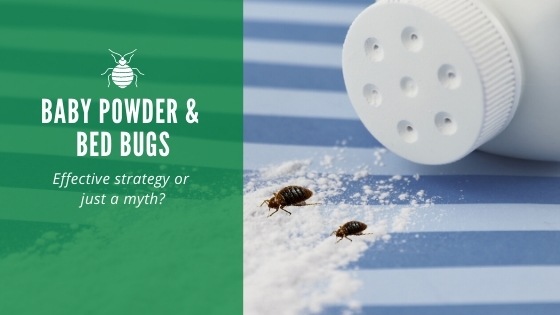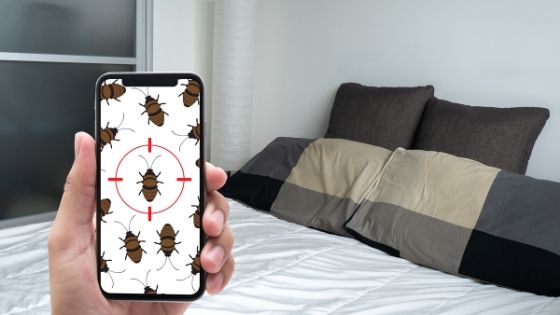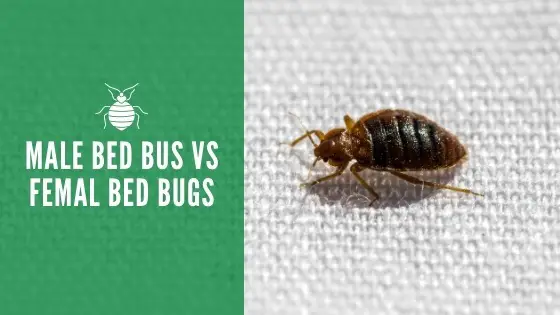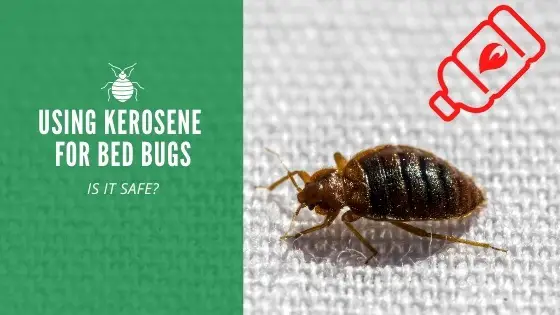Bed Bugs and Baby Powder (Talcum Powder)

Bed bugs can ruin your sleep and make you feel unwelcome in your own home. These little critters infest your mattress and bite you mercilessly while you sleep, leaving you with gross red welts on your skin and a bug-filled bed. Because they are such nuisances, people have come up with their own solutions to the bed bug problem.
Unfortunately, many of these “tricks” to kill bed bugs do not work at all. It is unclear how these rumors got started, but if you try them to get rid of your bed bugs, you will quickly learn that they are not based on reality.
Does Baby Powder (Talcum Powder) Kill Bed Bugs?
Baby powder (Talcum powder) and bed bugs, for some reason, have been linked through the internet. Baby powder does not kill bed bugs in any way, shape, or form. Using baby powder or talcum powder to try and treat a bed bug infestation is completely futile. You may slightly annoy the bed bugs, but your baby powder will not harm them.
There are claims that baby powder kills bed bugs by drying out their exoskeleton, desiccating them, and killing them after a short while. These are false. While certain powders can affect creatures with exoskeletons, baby powder is not one of them.
Certain “experts” claim that using baby powder on your mattress, bed frame, or box spring is a great way to catch the infestation and stop it in its tracks with a non-toxic, easy to obtain treatment. All evidence points to the contrary. While baby powder may have some dehydrating qualities, bed bugs can walk around it.
The other main “treatment” suggested for using baby powder on bed bugs relies on bed bug traps. In this method, baby powder is placed inside the trap, and the fine particles of the baby powder prevent bed bugs from leaving, causing their eventual death within the trap.
While this is closer to the truth, it is still not an effective way to take care of bed bugs. The bed bugs may have a more difficult time trying to escape the trap if the baby powder (talcum powder) is placed in it, but bed bug traps are not reliable to get rid of bed bugs. Bed bug infestations are so hard to treat in part because of their extremely rapid multiplication. A bed bug trap will never catch the entire colony, leaving you stuck in a cycle of only killing part of your colony at a time before they return to their original numbers, biting you, and staining your mattress all the while.
If you are looking for a more natural diy bed bug treatment you should give essential oils a try. A study from Rutgers University recently found that certain oils like blood orange oil in high concentrations can effectively help with bed bug control.
Other Powders That Kill Bed Bugs
Some of the confusion surrounding bed bugs and baby powder may come from other powders that work against insects. Perhaps someone saw a powder treatment for bed bugs and believed that the exterminator was spreading baby powder to kill the creatures, but baby powder is not approved by an expert in the field.
The most common powder used to treat insect infestation is called diatomaceous earth. This is a compound that is often used in greenhouses to treat insects without using toxic chemicals. Diatomaceous earth is unique because of its unique chemical compound. The particles of diatomaceous earth have sharp, jagged edges which are not visible to the naked eye. This means that it can pierce the exoskeleton of arthropods, such as bed bugs.
Once the diatomaceous earth has scored the body of the arthropod, it dehydrates the bug. Proponents of baby powder believe that this is the same effect that talcum powder has on insects. The difference is that baby powder has been clinically designed to be soft and cause minimal skin damage. In contrast, diatomaceous earth has the proper texture to break the outside layer of the insects.
It should be noted that diatomaceous earth is not 100% effective at treating bed bugs. While it will eventually kill the bugs that it comes into contact with, the process is slow. It can take weeks for diatomaceous earth to kill bed bugs, which is enough time for them to reproduce.
Diatomaceous earth is better suited to other kinds of insect treatments. The other kind of powder that can kill bed bugs is called CimeXa. This is a more refined compound that is much more effective at bed bug treatment. This powder is stable and does not have negative health effects linked to the compound.
CimeXa can kill bed bugs within 34 hours of exposure. This is much quicker than the weeks that diatomaceous earth requires to get rid of bed bugs. In addition, CimeXa is effective at destroying bed bugs for ten years after it is applied.
To apply CimeXa, you shake the powder in areas that you know insects will tread. The powder attaches itself to the lipid layer on their exoskeletons, and when the bugs go back to their colony, the powder will spread to the other members of the colony. If you prefer, you can also mix it with water to spray the combination around your house (though this will lessen the effectiveness of the CimeXa bed bug powder).
Ways to Kill Bed Bugs
Overall, powders are not the best way to get rid of bed bug infestations. Other DIY treatments like dryer sheets, baking soda, and rubbing alcohol should also be avoided. There are many proven and studied methods to get rid of bed bugs with much more accuracy and effectiveness. Heat is perhaps the best way to kill bed bugs and can be applied in many ways to destroy a colony.
If you have a bed bug infestation, it is always worth it to consult a professional. Pest control companies have tried and true methods to destroy your bed bug infestation with minimal stress to you. Call an exterminator if you think that you have a bed bug problem.



